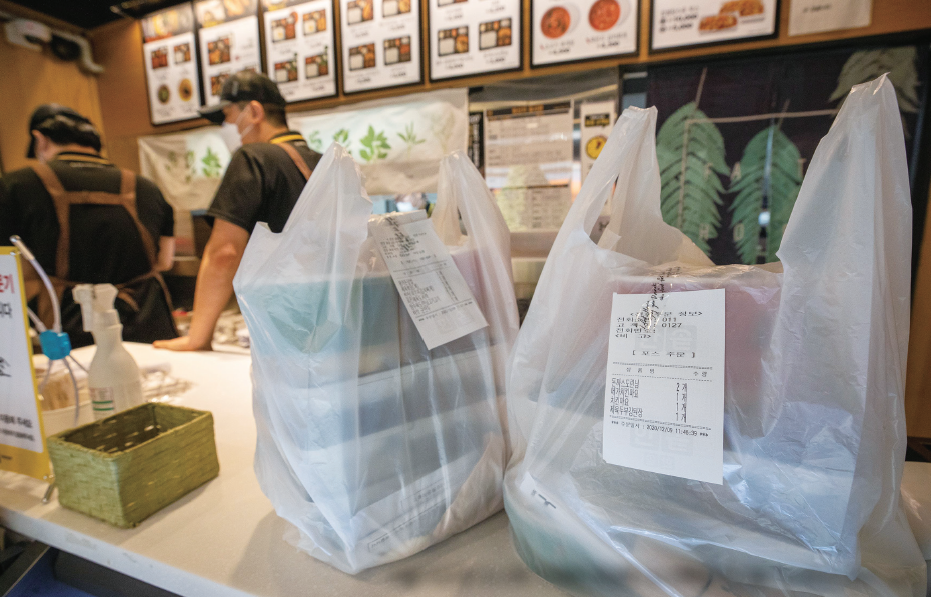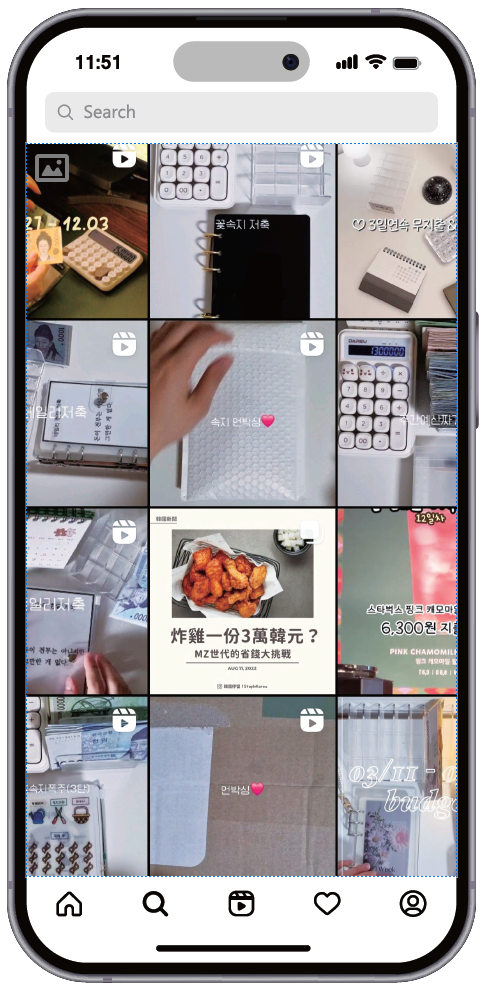Office worker Kim Min-wan (32) has been going to a lunch box restaurant during his office lunch hour for two months now. This is because food costs are the only area where consumption can be reduced in a situation where prices are soaring. Mr. Kim said, “Although food expenses are included in my salary, the cost of living has risen so much that when I go to a restaurant for lunch like usual, I don’t have enough money to spend on daily necessities or leisure activities. I thought that the easiest thing to reduce was food expenses, so I started eating boxed lunches.” He said. Recently, a 'lunchbox pod' (short for party, meaning a group of people) was created within the company to follow Mr. Kim's lead and eat boxed lunches for lunch to save money on food.
Taejun Lee (28), a job seeker, has been using lunch boxes for some time now. Mr. Lee said, “Originally, I would buy ingredients and cook my own side dishes at home, but at some point, that cost more money than buying a packed lunch. Now, I only cook my rice at home and buy my side dishes from a lunch box restaurant.”
 |
| A packed lunch box is waiting for its owner at a lunch box store in Seoul. photo news 1 |
Lunch box sales take off due to prolonged high inflation
Even as consumer sentiment hardens due to high inflation, the lunch box industry is doing well. According to related industries, the 2023 sales of Hansot, which operates Hansot Lunchbox, were 137.1 billion won, an 8% increase from 2022. During the same period, operating profit increased by 12.4% to 14.4 billion won. Hansot recorded operating profit in the 10 billion won range for the first time since its founding in 2022, and continued to increase in 2023, with operating profit exceeding 10 billion won.
Hansot Dosirak also felt this. On the afternoon of April 16, we visited and inquired at seven Hansot Lunchbox stores located in Jamsil-dong, Songpa-gu, Seoul and Daechi-dong, Gangnam-gu, and all seven responded that sales have been on the rise recently. Mr. Kim (51), who opened and runs a Hansot store in a residential area of Jamsil four years ago, said, “This year, I am definitely feeling the number of orders increasing,” adding, “Many young single-person households and elementary, middle, and high school students living in nearby residential areas visit the store. “He said. Even while I was talking with Mr. Kim, the delivery order alarm continued to ring inside the store.
For ‘extreme cost-effectiveness (price-performance)’, you can also find convenience store lunch boxes.
There is also a lot of movement towards convenience store lunch boxes. In particular, young people go on a 'closed run' to eat cheap convenience store lunch boxes at a cheaper price. Recently, convenience stores have been selling foods that are nearing their expiration date at a lower price than the regular price, and this is what they are targeting. Since there is no choice but to throw away the product after the expiration date, convenience stores' intention to sell it in any way coincides with the demand of young people who want to drastically save on food costs.
 |
| Posts related to the no-spend challenge posted on Instagram. photo instagram |
For example, GS25, a domestic convenience store brand, launched a 'last-minute discount' service that offers fresh food (lunch boxes, sandwiches, etc.) nearing its expiration date at a 45% discount in November 2023. According to GS25, the quantity of products sold at closing discounts increased 6.7 times in March this year compared to December 2023. The age range of customers was 38% in their 20s and 34% in their 30s. This means that 7 out of 10 consumers who use Deadline Run are in their 20s or 30s. Lunch boxes were the most popular products sold at last-minute discounts, followed by sandwiches and kimbap. Young people cited ‘cost-effectiveness’ as the reason for reaching for convenience store lunch boxes. Mr. Yoo (31), an office worker whom I met at a convenience store in Gangnam this afternoon, said, “For the price of the delivery food plus the delivery fee, you can eat up to four convenience store lunch boxes,” adding, “General restaurants are basically expensive, and if you go to a particularly cheap place, “Because we have to wait in long lines, the last resort is lunch boxes,” he said. Mr. Yu purchased two lunch boxes that were three hours before the expiration date for about 5,000 won and said, “Is there a restaurant these days where you can eat two meals for this price?”
The key is ‘reduce spending’
Ultimately, the key reason behind the growing trend of people looking for boxed lunches is ‘reducing spending.’ Ms. Jeong (33), a freelancer who works in a shared office, recently prepared her lunch by making a boxed lunch with leftover side dishes at home. Mr. Jeong said, “The prices are rising, but my income remains the same, so I decided to reduce my expenses. I cut down on eating out and replaced my coffee with coffee from the stew, saving 30 to 40 percent of my expenses.”
A lifestyle pattern like Jeong's is recently known as 'Jjantech' (a compound word of Jjada and Investment) among the MZ generation (Millennials + Generation Z, born between 1981 and 2010). Beyond simply saving money on food, Chantech is a behavior that drastically reduces consumption, such as the 'zero spending challenge' of not spending a penny all day, or the 'happiness of 10,000 won' of spending less than 10,000 won a day. They are reducing their spending by ‘reducing eating out’, ‘using short distance walking’, ‘using the company cafeteria’, ‘app tech’, and ‘using the second hand market’.
At 8 p.m. on April 15, Mangwon Hangang Park was crowded with people who chose to run the Han River instead of using the treadmill at the gym. Kim Jang-woo (36), an office worker we met here, participated in the ‘No Spending Challenge’ and said, “We are now in an era where just eating a bowl of cold noodles costs more than 10,000 won.” He added, “I am saving money for my wedding by quitting the gym I used to go to and reducing my dinner plans.” “He said. This trend was also reflected in statistics. According to the National Statistics Portal of the National Statistical Office, the retail sales index as of last February was 101.4, the lowest level since November 2020 (101.2), when consumption froze sharply due to the COVID-19 pandemic. As the interest burden due to high interest rates combined with rising prices, consumption decreased significantly.
“For MZ, extreme frugality is a kind of play culture.”
There are also young people who engage in ‘app tech’, which involves collecting points and cashing them out using money-making applications (apps). Jang Su-min (25), a job seeker who uses an app that allows you to earn money while walking, ran 6km with a running crew at Yeouido Hangang Park on this day and accumulated points. Mr. Jang, who has no income other than his part-time job on the weekends, said, “I can save up to 140 won every day, which is equivalent to the cost of a cup of coffee a month.” A Toss official who operates a similar service said, “As prices have risen significantly recently, the number of users using the app has increased.”
‘Fridge digging’, which involves not going grocery shopping until the food ingredients in the refrigerator are used up, is also popular. Ms. Lee (42), a housewife of 12 years, said, “As gas and electricity bills have risen, I wanted to cut down on food costs, so I researched recipes that can be made with leftover side dishes. When I go to the supermarket, I usually end up spending a few hundred thousand won, so I avoid shopping.” He said.
In KakaoTalk's open chat room, 'beggars' who help people control their spending appear and evaluate each other's spending. Consumption that is considered wasteful is criticized, and people who do not spend money are praised and encouraged to take the no-spend challenge. Eunhee Lee, a professor of consumer studies at Inha University, said, “It can be seen as a trend to feel a sense of kinship and gain comfort by turning the depression and psychological loss caused by the significant decline in consumer sentiment due to the recession into play culture,” adding, “As curbing spending is difficult, we support each other.” “I think this culture will spread further,” he explained.
No comments:
Post a Comment